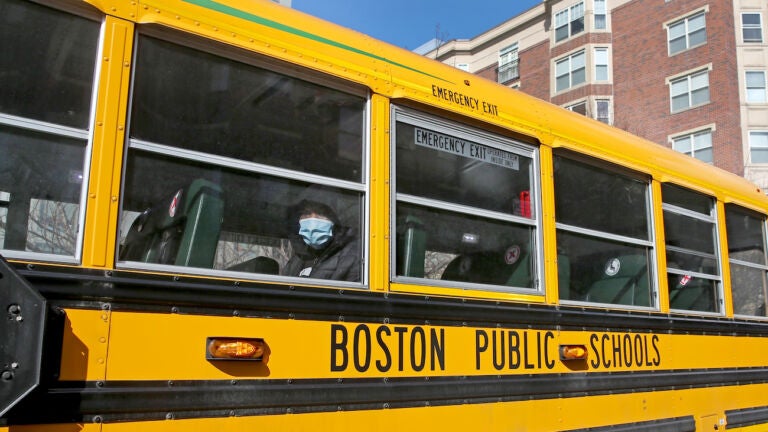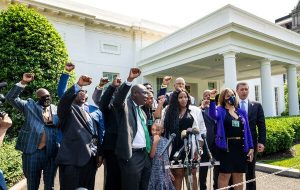Education
“I’m very, very, very troubled by this,” Superintendent Brenda Cassellius said of the independent report’s findings.
Boston Public Schools Superintendent Brenda Cassellius said Monday the district ended its relationship with the nonprofit organization Youth on Board after an independent report detailed student complaints and concerns about its counseling program and its former director.
The 10-page report found that students on the Boston Student Advisory Council — a student union with members elected from across city high schools — felt the director stifled their voices and emotionally manipulated them.
Both students and junior staffers of Youth on Board also had “serious concerns” about the use of re-evaluation counseling, or RC, which students described as “weird, uncomfortable, cult-like.”
“I’m very, very, very troubled by this,” Cassellius told The Boston Herald following the release of the report on Monday.
Boston Public Schools hired an outside investigator, former Weston schools superintendent Alan Oliff, to conduct the probe into BSAC practices after a wave of student resignations in March and students came forward with the complaints, particularly involving Jenny Sazama, a co-founder and director of the nonprofit.
“Students felt uncomfortable, they felt they were manipulated and were paid to participate — that’s what’s troubling to me, regardless of the type of program, that’s inappropriate,” Cassellius told The Boston Globe. “That’s why we dealt with this swiftly.”
RC, which, according to the Globe, is both a version of group counseling and an international organization that promotes its practice, involves people relating to difficult personal experiences and releasing emotions by laughing, crying, or screaming. Tim Jackins, the head of RC, has denied that the organization is cult-like, the newspaper reported.
The report did not cover RC techniques or further explore the “cult-like” allegation but found that students felt pressured to attend sessions, which were held in the basement of Sazama’s house before the COVID-19 pandemic hit. Subsequent sessions were held virtually.
Students told Oliff that Sazama frequently texted them and called them early in the morning or late at night to try to convince them to attend sessions, and most who were interviewed said they felt “RC was not an appropriate peer counseling program for them,” Oliff wrote.
“Student interviewees who shared personal confidential information in RC sessions felt betrayed and manipulated by Jenny Sazama both in personal and more public conversations,” Oliff wrote. “It was reported by interviewees that it was common for Jenny to ask a student to do additional work and use personal issues they had raised as reminders about how this would be a good thing for them given their challenges. These types of reminders were described as incessant and uncomfortable.”
Students also said no permission was “granted regularly by parents” for participation in RC, and many said they kept going despite the discomfort because their friends were there and because they were paid for their time on BSAC.
Sazama told Oliff that she did not have credentials for counseling and said that while the program was referred to as RC, the sessions were peer counseling using a variety of methods that included RC, Oliff wrote.
Cassellius told the Globe the district ended its relationship with Youth on Board and said she was unaware that RC sessions took place in Sazama’s home, which is not usually permitted. (The district had suspended its partnership with Youth on Board in March.)
In a statement to Boston.com Tuesday, Sazama, who is no longer employed by Youth on Board or its parent organization, Youth Build USA, said the former’s relationship with BSAC “has been highly successful and nationally recognized for more than two decades.”
“It’s unfortunate to see it come to an end under these circumstances,” Sazama said in the statement. “I hope that the students of Boston will continue to have a voice in how the schools are governed. I have spent my career fighting alongside them for their right to be heard.”
Cassellius and Monica Roberts, her chief overseeing the BSAC program, said they did not know students felt uncomfortable in the RC sessions nor did they know the extent to which the techniques were used in counseling.
The report recommended that district administrators thoroughly review any counseling program and that such a program include qualified counselors moving forward.
“The implementation of an RC program without any qualified counseling personnel and no apparent oversight has been a problem,” the report says. “It is not clear whether BPS conducted a review of the RC program by any of its professional counseling staff.”
According to the report, students also said that Sazama stifled their voices on the BSAC by, among other ways, shutting students out of setting agendas for meetings and leaving little time for student officers to discuss future meetings, although Sazama “dominated the conversation and pushed her own agenda.”
“Student leaders reported that when they requested more time on specific topics in future meetings, they were told by senior leadership that it was not possible, there was too much to do,” the report says.
Multiple people interviewed in the investigation also raised concerns about how Sazama used funding, including spending it on gifts, personal purchases, and “regular use of a ‘petty cash’ fund,” the report said.
In recommendations to school officials, Oliff wrote that administrators should work with BSAC student leaders to revise the council’s operations in the coming school year.
Cassellius vowed to the Globe she will work to prioritize student voices.
The district will also discontinue the use of RC and will issue a request for proposals for a new organization to co-mange the BSAC with school officials.
The report also recommended, among other points, the district review funds reportedly used by Sazama. According to the Globe, the district provided less than $10,000 this school year.
Youth Build USA told the Globe on Monday that it cooperated with the investigation and understands the district’s decision to part ways. The organization also clarified that Youth on Board operated separately from Youth Build USA.
Read the full report:
2021-5-24 BSAC Investigation Report Final by Christopher Gavin on Scribd
Newsletter Signup
Stay up to date on all the latest news from Boston.com






